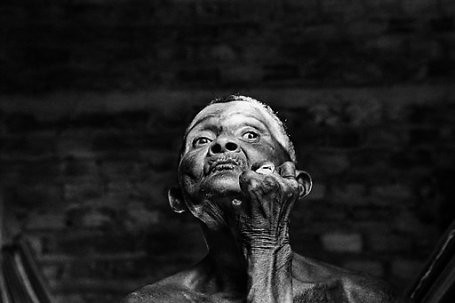Jul 28
20100
commentsIn Abundance, Belonging, Confusion, Connecting, Conversation, Growth, Leprosy, Loneliness, Meaning, Pain, Relationships, Self Leadership
TagsConversations Humanity Inviting God Judgement Meaning and Purpose
The Leprosy of Our Day
Oh what an awful title to start this entry for the day. But, have you ever thought about it? Jesus confronted, held and touched, and healed one of the most debilitating and damaging illnesses of His day-leprosy. All lepers (due to the contagion of the illness) were automatically removed from society, held with disregard, treated as if substandard, and lastly, left to die within their little community of lepers. How tragic and utterly baneful this must have been for those who contracted the disease. Why did Jesus go out of his way to make a difference, to relate, engage, heal, and love these people?
thought about it? Jesus confronted, held and touched, and healed one of the most debilitating and damaging illnesses of His day-leprosy. All lepers (due to the contagion of the illness) were automatically removed from society, held with disregard, treated as if substandard, and lastly, left to die within their little community of lepers. How tragic and utterly baneful this must have been for those who contracted the disease. Why did Jesus go out of his way to make a difference, to relate, engage, heal, and love these people?
 As in many of the Lord’s parables where he touches the very heart of broken, sinful, and lost humanity, He does so with these people. Jesus most often elevates the truthful, and compassionate response to humanity while ensuring that the point is not to expose humanity and how bad it is. “Our tragedy is that most often, we focus on what people are not rather than what they are and what they can become.“
As in many of the Lord’s parables where he touches the very heart of broken, sinful, and lost humanity, He does so with these people. Jesus most often elevates the truthful, and compassionate response to humanity while ensuring that the point is not to expose humanity and how bad it is. “Our tragedy is that most often, we focus on what people are not rather than what they are and what they can become.“
So…what is the leprosy of our day? As mentioned earlier in one of my first entries, I am a therapist and a consultant. I spend many hours listening intently to the circumstances, stories, and relational exchanges that seem to create stuckness in the mire of life. I am convinced that the Leprosy of Our Day has less to do with physical illness and more to do with our response towards our overriding ”fear of not belonging.” What do I mean? Let me explain.
Because we were all made for meaningful connection, our proclivity for perspective is to belong. We all arrange our grid for viewing life each day with an emotional focus to insure belonging. When we stumble upon a person who is “different” or perhaps going through something that we would dread going through, our immediate grid becomes jaded with our fear and asks, “If I engage would I belong?” If we are afraid, our belonging meter begins to show alarm. As a means of self-protection, we then become suspect, possibly even judgemental towards the person, or group therefore insuring our own cleansing from the system while protecting what we have already set up as our “criteria and system of belonging.”
Lepers are created by our own perceptions of what is “not acceptable” and reinforced by our engrained response of judgements and rationalizations of why another is truly an outcast. So..the leprosy is not necessarily a certain issue as much as it is a response to the issues with an already preconceived grid of insuring self-protection and deemed purity.
A good friend recently went to the Holy Land on a tour. His instructor  Ray Vander Laan said it well, “Jesus came to bring order in the midst of disorder, he came to enter into the chaos and not skirt it to appear more righteous.” Oh, how difficult this is. What is certain is we cannot do it alone, we need each other, our perspectives need to be refined and transformed into the image of true love, and we need to be having conversations with the Lord and each other about our struggle in the midst of it.
Ray Vander Laan said it well, “Jesus came to bring order in the midst of disorder, he came to enter into the chaos and not skirt it to appear more righteous.” Oh, how difficult this is. What is certain is we cannot do it alone, we need each other, our perspectives need to be refined and transformed into the image of true love, and we need to be having conversations with the Lord and each other about our struggle in the midst of it.
Photos Courtesy of Natalie Tumasian,U.Wili,, MoonJazz






